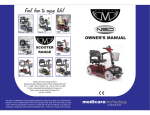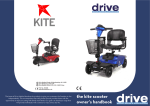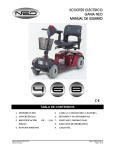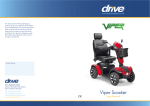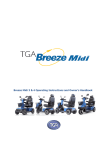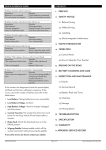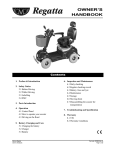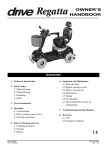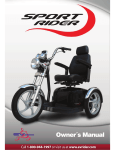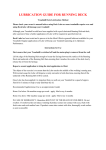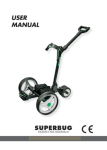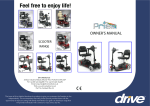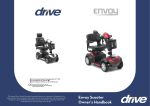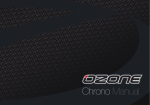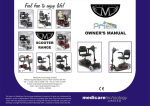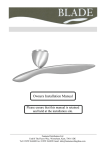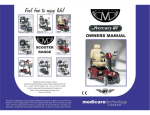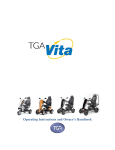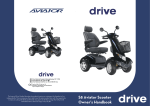Download neo electric scooter range owners handbook
Transcript
NEO ELECTRIC SCOOTER RANGE OWNERS HANDBOOK TABLE OF CONTENTS 1. PREFACE AND INTRODUCTION 5. BATTERY CHARGING AND CARE 2. SAFETY NOTICE 6. INSPECTION AND MAINTENANCE 3. PARTS DESCRIPTION 7. DISASSEMBLY AND ASSEMBLY 4. OPERATION 8. TROUBLESHOOTING & SPECIFICATION 9. WARRANTY Mercury Neo electric scooters Owner’s Handbook Part Code: Z40948 (Rev C) Page 1 of 24 1. PREFACE AND INTRODUCTION Please carefully read this owner’s manual before using the vehicle. Improper use of the vehicle could result in harm, injury or traffic accidents. Therefore to get the most from the vehicle read this owner’s manual. • This owner’s manual includes operating instructions for every aspect of the vehicle, assembly instructions, as well as instructions on how to deal with possible incidents. • The symbols used in this manual are explained below. Pay particular attention the notes marked with the symbols below: 1 Warning: ) Attention: Suggestion: Improper use could result in serious injury or death Improper use could lead to injury and/or damage to your scooter Follow these instructions to keep your vehicle in good working order • This manual includes a copy of the repair and maintenance record chart and warranty information. Keep it in a safe place or with the scooter. • If somebody else uses the scooter, make sure that you provide them with this owner’s manual for his or her consideration. • As designs change some illustrations and pictures in the manual may not correspond to the vehicle that you purchased. We reserve the right to make design modifications. • There are three scooters in the Neo range. The Neo Standard has a top speed of 4mph and is a class 2 vehicle as described by the Road Traffic Act 1988. The Neo 6 is a class 3 vehicle and gains a 6mph top speed, indicators and rear view mirror. The Neo 8 has an 8mph top speed, additional cable brake, indicators and rear view mirror. Suggestion To optimise battery efficiency and longevity, fully recharge your new batteries before first use. Mercury Neo electric scooters Owner’s Handbook Part Code: Z40948 (Rev C) Page 2 of 24 2. SAFETY NOTICE 2.1 BEFORE DRIVING The user needs to be familiar with the use and operation of this vehicle before driving. Therefore, always keep the following safety notices in mind. • The same traffic rules apply to the use of this vehicle as apply to pedestrians For your safety, follow the rules that apply to pedestrians. • • The scooter is designed primarily for pavement and pedestrian area use. The Standard Neo scooter should only be driven on the road to cross the road or where a pavement does not exist. The scooter should not be used on dual carriageways or motorways. • The Neo 6 has a 6mph top speed and the Neo 8 has an 8mph top speed. Both these scooters can be used on the road or pavement. If used on the pavement, the indoor setting must be used. The scooters should not be used on dual carriageways or motorways. • Be aware of traffic when crossing or using the road. • Be extremely cautious when driving your scooter on busy streets or in shopping centres. • Do not drive your scooter after consuming alcohol or when you are tired. It is an offence to drive this scooter whilst under the influence of alcohol or drugs. • Be careful when driving your scooter in low light. It has not been designed for use at night. Practice operating your vehicle Before using the scooter in busy or potentially dangerous areas familiarize yourself with the operation of your scooter. Practice in a wide and open area like a park. In order to avoid accidents with your scooter whilst driving, bear in mind driving motions, such as accelerating, stopping, turning, reversing and travelling on gradients. • • Turn the speed dial to approximately one-third for your initial practice. • Be sure somebody accompanies you for safety when driving on the road for the first time. • Only travel at higher speeds when you are confident that you can easily operate and control your scooter. The scooter is only to be used by one person at a time Do not carry passengers on your scooter (including children) • Do not use this vehicle to carry or haul goods • The maximum weight capacity for these scooters is 135kg (21 stone) as stated in the ‘Specification’ section. • Maximum loading weight for the front basket is 5kg (11lb). Mercury Neo electric scooters Owner’s Handbook Part Code: Z40948 (Rev C) Page 3 of 24 2.2 WHILST DRIVING • • • • Before driving, carry out daily inspections. Refer to the section entitled ‘Daily Checking’ • Do not move your body out of the vehicle whilst moving • Pay attention that your clothes do not get caught in the wheels. Such action may cause you to lose balance and risk injury from falling Do not use your vehicle under the circumstances below: • On surfaces that are muddy, gravely, bumpy, narrow, snowed over, icy or canal towpaths not guarded by any fence or hedge. Keep away from places where you might get the wheels stuck • Do not drive at night or when it is raining, snowing, misty or windy • Do not drive your vehicle in an ‘S’ pattern or make erratic turns • Do not take the scooter onto escalators • UNDER NO CIRCUMSTANCES SHOULD THE SCOOTER BE USED AS A SEAT IN A MOTOR VEHICLE (E.G. CARS, BUSES, TRAINS, ETC) About mobile phone and other electrical equipment • Do not use a mobile phone or other long-range wireless communication devices whilst driving. • Always switch off the scooter and remove the ignition key before using a mobile phone. • Do not charge the mobile phone or any other electrical devices from your scooter’s battery Automatic Power Shut Down In order to avoid accidental battery run down, your scooter is equipped with an automatic power shut down facility. If the scooter is switched on, after remaining undisturbed for a period of thirty minutes it will automatically turn off. Should this occur, simply switch your scooter off and back on and it will be ready to use once again. • Ramps, Gradients and Drops • Do not drive onto gradients steeper than 8° (1 in 7) • Always use a low speed setting when ascending or descending a gradient • Do not drive on roads with large drops or potholes. The ground clearance of the scooter is 8cm (3”) • Do not cross water gutters which are too wide and a risk of getting the wheels stuck. • Slow down when driving on gradients • Some buildings have ramps with turning switchbacks. In this case, drive slowly and take wide swings with the front wheels around any corners. This will reduce the risk of you cutting the corner and causing damage to your scooter from the corner, railings or any other objects near the corner. Mercury Neo electric scooters Owner’s Handbook Part Code: Z40948 (Rev C) Page 4 of 24 • Starting and Driving 1. Make sure the seat is installed properly 2. Make sure the tiller has been secured properly 3. Fold down the armrests so you can rest your arms on them 4. Turn the ignition on. If necessary, turn on the headlights 5. Check battery indicator to see whether there is enough power for your journey. If you have any doubt about the remaining power, recharge the batteries before departure 6. Set the speed dial to a position you feel safe and comfortable with 7. Check the forward / reverse wigwag paddle works correctly 8. Make sure the electromagnetic brake works correctly 9. Make sure it is safe around you before you begin to drive. If you are driving a Neo 6 or Neo 8, use the indicators if required. 1 ) WARNING • Do not set in the freewheel mode when driving on a gradient. • Always re-engage the anti-freewheel device before use. Failure to do so may result in injury. • To protect your safety, the power will automatically cut off and the electromagnetic brake system will activate whilst you are driving down a steep gradient. This will limit the speed to a safe level. Turn the power on again to restart your scooter. • Maximum user weight limit • The maximum user weight for the scooter is 135kg (21 stone). Overloading past this weight limit may lead to damage of your scooter or cause it to malfunction and will endanger your safety. The warranty does not cover this type of damage. ATTENTION 1. Do not push both RH and LH sides of the wigwag paddle simultaneously. This might leave you unable to control your scooter. 2. Do not turn the ignition off whilst driving as this will lead to an emergency stop and possible risk of accident and injury. 3. Do not adjust the speed dial whilst driving, a sudden change in speed may cause danger to you and others, and may cause damage to your scooter. 4. Do not place magnetic devices near the controller and tiller areas as this could affect the safe operation of your scooter. 5. Do be careful whilst driving in heavy traffic or crowded areas. 6. Whilst reversing the vehicle, beware of people and / or objects behind you. Mercury Neo electric scooters Owner’s Handbook Part Code: Z40948 (Rev C) Page 5 of 24 • Stopping 1. Release the wigwag paddle completely. The vehicle will naturally brake and stop. 2. Switch the ignition OFF. Then pull out the key. ) Attention ♦ The stopping distance will vary with your forward / reverse speed. Therefore please begin braking as early as you can. • Whilst parking your scooter, be sure to park on flat ground and then switch the ignition “OFF” before you disembark. 2.3 LABELLING Please carefully read all the labels on the scooter before using. For your future reference, do not remove the labels. Copies of the labels and their positions are shown below: Mercury Neo electric scooters Owner’s Handbook Part Code: Z40948 (Rev C) Page 6 of 24 2.4 EMI This section will provide the user with basic information that describes the problems with EMI, known sources of EMI, protective measures either to lessen the possibility of exposure or to minimize the degree of exposure, and suggested action should unexpected or erratic movement occur. Caution: It is very important that you read this information regarding the possible effects of electromagnetic interference on your electric scooter. ELECTROMAGNETIC INTERFERENCE (EMI) FROM RADIO WAVE SOURCES Power vehicles may be susceptible to electromagnetic interference (EMI), which is interfering electromagnetic energy (EM) emitted from sources such as radio stations, TV stations, amateur radio (HAM) transmitters, two-way radios, and cellular phones. The interference (from radio wave sources) can cause the powered vehicle to release its brakes, move by itself, or move in unintended directions. It can also permanently damage the powered vehicle’s control system. The intensity of the interfering EM energy can be measured in volts per metre (V/m). Each powered vehicle can resist EMI up to a certain intensity. This is called it's ‘immunity level’. The higher the immunity level, the greater the protection. At this time, current technology is capable of achieving at least a 20 V/m immunity level, which would provide useful protection from the more common sources of radiated EMI. This powered vehicle as shipped, with no further modification, has an immunity level of 20 V/m without any accessories. There are a number of sources of relatively intense electromagnetic fields in the everyday environment. Some of these sources are obvious and easy to avoid. Others are not apparent and exposure is unavoidable. However, we believe that by following the warnings listed below, your risk to EMI will be minimized. The sources of radiated EMI can be broadly classified into three types: 1. Hand-held portable transceivers (transmitter-receivers with the antenna mounted directly on the transmitting unit. Examples include: citizens band (CB) radios, ‘walkie talkies’, security / fire / police transceivers, and mobile telephones. Note: Some mobile telephones and similar equipment transmit signal whilst they are ON, even when not being used. 2. Medium-range mobile transceivers, such as those used in police cars, fire engines, ambulances and taxis. These usually have antennae mounted on the outside of the vehicle. 3. Long-range transmitters and transceivers, such as commercial broadcast transmitters (radio and TV broadcast towers) and amateur (HAM) radios. Note: Other types of hand-held devices, such as cordless phones, laptop computers, AM/FM radios, TV sets, CD and DVD players, and small appliances such as electric shavers and hair dryers, so far as we know are not likely to cause EMI problems to your powered vehicle. POWERED VEHICLE ELECTROMAGNETIC INTERFERENCE (EMI) Because EM energy rapidly becomes more intense as one moves closer to the source, the EM fields from hand-held radio wave sources (transceivers) are of special concern. It is possible to unintentionally bring high levels of EM energy very close to the powered vehicle’s control system whilst using these devices. This can affect vehicle movement and braking. The warnings listed below are recommended to prevent possible interference with the control system of the vehicle: Mercury Neo electric scooters Owner’s Handbook Part Code: Z40948 (Rev C) Page 7 of 24 Warnings: EMI from sources such as radio and TV stations, amateur radio (HAM) transmitters, two-way radios, and mobile phones can affect your vehicle. Following the warnings listed below should reduce the change of unintended brake release or powered vehicle movement which could result in serious injury. 1. Do not operate hand-held transceivers (such as CB radios) or turn on personal communication device (such as mobile phones) whilst the scooter is switched on. 2. Be aware of nearby transmitters (such as radio or TV station) and try to avoid coming close to them. 3. If unintended movement or brake release occurs, switch the scooter off as soon as it is safe. 4. Be aware that adding accessories or components, or modifying the scooter, may make it more susceptible to EMI (Note: There is no easy way to evaluate their effect on the overall immunity of the scooter). 5. Report all incidents of unintended movement or brake release to the scooter manufacturer and note whether there is a source of EMI nearby. IMPORTANT INFORMATION 1. 20 V/m is a generally achievable and useful immunity level against EMI (the higher the level, the greater the protection) 2. This scooter has an immunity level of 20 V/m without any accessories connected to it. The scooter is fitted with a PG Drives S-Drive controller which has an immunity level of 35 V/m. Mercury Neo electric scooters Owner’s Handbook Part Code: Z40948 (Rev C) Page 8 of 24 3. PARTS DESCRIPTION PARTS DESCRIPTION 1 1. Tiller head 7 2 8 2. Shopping basket 3. Tiller adjustment knob (Neo 4 & 6) 6 4. Head lamp 5. Front indicator light 3 6. Seat 5 7. Arm rest 8. Seat lever (for swivelling) 4 9. Side reflector 5 10 9 10. Seat lever (for legroom adjustment) 11. Rear view mirror (not shown) 13 12. Rear indicator light (not Neo 4) 13. Rear lamp (on Neo 4, this is 12 located in the centre of the rear shroud) 14 14. Anti tip bar / wheel 15 15. Freewheel lever 4. OPERATION 4.1 CONTROL PANEL (Neo 4 and 6) 1. Wigwag paddle 2. Indoor / Outdoor Switch * 3. Indicator Switch * 4. Ignition 5. Speed Dial 6. Headlights Button 7. Battery Gauge 8. Power Eye 9. Hazard Warning Button * 10. Horn Button (* on Neo 6 only) Mercury Neo electric scooters Owner’s Handbook HORN BUTTON SPEED 5 DIAL KEY IGNITION BATTERY GAUGE HAZARD WARNING HEADLIGHT BUTTON INDICATOR SWITCH INDOOR / OUTDOOR SW. WIG WAG PADDLE Part Code: Z40948 (Rev C) Page 9 of 24 4.1 CONTROL PANEL (Neo 8) 1. Wigwag paddle 2. Indoor / Outdoor Switch 3. Indicator Switch 4. Ignition 5. Speed Dial 6. Headlights Button 7. Battery Gauge 8. Power Eye 9. Hazard Warning Button 10. Horn Button BATTERY GAUGE HAZARD WARNING SW. SPEED DIAL HEADLIGHT BUTTON INDICATOR SWTICH WIG WAG PADDLE INDICATOR SWTICH INDOOR / OUTDOOR SW. KEY IGNITION 4.2 HOW TO OPERATE YOUR SCOOTER Key Ignition The key ignition acts as the power switch for the scooter. To switch the power on, turn the key clockwise in the ignition. The power eye should illuminate. To switch the power off, turn the key anticlockwise. The power eye should switch off and the key can be removed if required. Speed Dial Turn the speed dial to determine the maximum speed of the scooter. Turn the dial clockwise to increase the speed setting and turn the dial anticlockwise to decrease the speed setting. Moving and Braking Neo 4 and 6: Push the right-hand side of the wigwag paddle forwards with your right thumb and the scooter will move forward. Push the left-hand side of the wigwag paddle forward with your left thumb and the scooter will move backward, emitting an audible reversing alarm. Neo 8 and scooters with fitted with a Delta handlebar: Put your hands on the handlebar and squeeze the right-hand side of the wigwag paddle and the scooter will move forward. Squeeze the left-hand side of the wigwag paddle and the scooter will move backward, emitting an audible reversing alarm. To brake, release the wigwag paddle. This will return to neutral and activate the electromagnetic brake automatically. This will bring the scooter to a prompt stop. The wigwag paddle allows you to control the speed of the scooter up to a maximum speed determined by the Speed Dial. The further the wigwag paddle is deflected, the faster the scooter will go. Horn Button Press the horn button to sound the horn. Release the button to stop the horn Mercury Neo electric scooters Owner’s Handbook Part Code: Z40948 (Rev C) Page 10 of 24 Braking Electromagnetic brake: Release the wigwag paddle completely, and the electromagnetic brake will be activated automatically, and the scooter will stop. The Neo 8 has an additional cable brake. The brake lever is located on the handlebars. To operate the brake squeeze the brake lever. 1 Warning When on a gradient NEVER set the vehicle to the freewheel mode. The electromagnetic brakes will not be applied. This may result in injury or damage. Indicator Switch (Neo 6 and Neo 8 only) The Neo 6 and Neo 8 are installed with fully functioning indicators for road use. The indicator switch is located at the front of the tiller pod. Push the switch in the required direction of travel to operate the indicators. Then push the switch back to the centre to switch off the indicators. Indoor / Outdoor switch (Neo 6 and Neo 8 only) The Neo 6 has a 6mph top speed and the Neo 8 has an 8mph top speed. They are installed with an indoor / outdoor switch. The top speed is only obtainable when the switch is set to outdoor mode. The scooter cannot travel faster than 4mph when the switch is set to indoor mode. The indoor mode should be selected whenever the scooter is being used indoors or on the pavement / pedestrian areas. The switch is located underneath the tiller pod, just below the wigwag paddle. Push down on the side of the switch with the white dot to set ‘indoor mode’, and push the other side of the switch to set outdoor mode. Seat The seat can be rotated and locked in position at 45° intervals. Push the seat adjustment lever forward and swivel the seat. Release the lever, and then continue swivelling the seat until it locks in position. The position of the seat can also be adjusted to offer better legroom. To alter the position, pull the lever located at the front of the seat and slide the seat backwards or forwards until the required position is reached ) Attention Return the seat to the forward position before driving. • Battery Gauge. The battery gauge on the tiller console lights LEDs to show remaining power: Green (3 or 4 LEDS lit) - 40% - 100% capacity Yellow (2 LEDs lit) - draining charge (10% - 30%) Red (1 LED lit) - immediate recharge is necessary. The remaining power indicated by the battery gauge will vary by the driving time incurred and how you drive. Repeated starting, stopping and climbing will consume power more quickly. The gauge is shown right. Mercury Neo electric scooters Owner’s Handbook Part Code: Z40948 (Rev C) Page 11 of 24 If the leftmost LED is flashing, this means the scooter has encountered a problem. The LED will flash a number of times then pause. If this occurs, switch off the scooter and restart ensuring that the wigwag paddle is released and the freewheel lever is engaged to DRIVE. If this does not solve the problem try recharging the batteries. If the problem still persists, contact your dealer. Suggestion 1. You should recharge the batteries after each time the vehicle is used to ensure maximum range. The batteries should be charged up at least once a week even if the scooter is not used. 2. After charging or replacing a new battery, drive the vehicle for 2-3 minutes to make sure the battery capacity is sufficient. 3. In wintertime, the battery may respond more slowly and the battery range may be reduced 4. When driving on a gradient, the battery indicator gauge may fluctuate. This is a normal phenomenon so please do not worry. 5. Even if the battery is used properly, it is natural for the battery’s capacity to reduce with time, which results in reduced battery range compared to a brand new battery. The batteries should be replaced when their capacity is less than half of that when they were performing optimally. Please see your dealer about replacement batteries. If you continue to use an old battery when it should be replaced, it could lead to a rapid decline in performance. 6. The battery range will be reduced when driving frequently on a slope or rough terrain, as this leads to greater consumption of power. 7. The batteries have a twelve-month warranty covering manufacturing defects. This warranty does not cover faults due to incorrect battery recharging. 4.3 HOW TO SET FREEWHEEL MODE The motor on the scooter can be disengaged to allow the scooter to be pushed . Drive Mode To put the scooter in to ‘drive’ mode, push the freewheel lever up completely. LEVER DRIVE Freewheel Mode FREEWHEEL 1 To put the scooter in to ‘freewheel mode’, push the freewheel lever down completely and the scooter can be moved manually. (See photo left). Please note that this will put the scooter in to freewheel mode, so the scooter’s motor and brake will be disengaged. Warning: Never operate the freewheel lever whilst sat on the scooter or on an incline. Failure to do so may result in damage or injury. Mercury Neo electric scooters Owner’s Handbook Part Code: Z40948 (Rev C) Page 12 of 24 4.4 TILLER ADJUSTMENT Neo 4 and Neo 6 Tiller Adjustment Turn the handwheel (arrowed) anticlockwise to loosen the tiller. Position the tiller as required by the user and then retighten the tiller by turning the handwheel clockwise. Neo 8 Tiller Adjustment The Neo 8 features a gas strut mechanism, allowing a user to change the tiller angle at the push of a button. Push or pull the button on the tiller and adjust it to the required angle. Release the button to secure. Mercury Neo electric scooters Owner’s Handbook Part Code: Z40948 (Rev C) Page 13 of 24 5. BATTERY CHARGING AND CARE 5.1 CHARGING THE BATTERY Follow the procedure below step by step: 1. Switch the ignition (OFF) 2. Connect the charger’s power cord into the power outlet. 3. Connect the charger’s round plug to the charging socket (the charging socket is located on the left hand side of the tiller head) 4. Switch the charger on. 5. Both the charger’s red and orange LEDs will be lit when beginning charging. The charging duration is approximately 10 hours. To ensure optimum performance a 12 – 14 hour charge is recommended. 6. Both the charger’s LEDs will be lit during the charging process. The orange LED will turn green when bulk charging is complete after which the charger trickle charges the batteries. Trickle charging optimises the batteries and is necessary to maintain or improve battery performance. 7. Turn off the charger, disconnect the power cord and the round plug from charger socket on the scooter. Suggestion 1. Do not disconnect the charger cord if charging is not completed. The battery life will be seriously shortened or decayed if the battery is repeatedly used without being fully charged. Therefore be sure to charge the battery fully every time. 2. Always complete the charging until the orange LED light turns green. NEVER stop charging before it is complete. 3. When fully charged, the battery charger will still trickle charge the battery to ensure optimum range. 4. If you do not use your scooter for a long time, it should be charged at least every week to keep the battery in a fully usable condition. 5. The ambient temperature will affect charging time. Charging time will be longer in the winter. 6. After charging, do not leave the charger socket plugged in to the scooter, as this will cause a power drain on the scooter and temporarily reduce its range. 7. The batteries carry a twelve-month manufacturer's warranty. This warranty only covers issues relating to manufacturing faults, and not faults relating to failure to recharge the batteries as instructed above. 8. Should range or power problems arise, please charge your scooter for 24 hours continually and then retry the scooter. ) Attention: Please follow the rules below to avoid accidents while charging. 1. Please use the Mercury 24V charger only, and recharge the battery to its full capacity every time. You may damage the battery and scooter if you use a charger which is not to the correct specification. 2. Never disassemble or modify the charger. 3. Please charge in a well-ventilated space where it is not directly exposed to the sunlight. Do not charge in surroundings where it is humid, damp or wet. Do not charge in temperatures less than -10°C or higher than +50°C as the charger may not 4. work well and the batteries may become damaged. Mercury Neo electric scooters Owner’s Handbook Part Code: Z40948 (Rev C) Page 14 of 24 1 5.2 Warning 1. Always ensure the mains lead is fully inserted in to the input socket on the charger. Keep away from flammable objects whilst charging as it may lead to fire or explosion of the battery. 2. Do not smoke whilst charging as the battery may release hydrogen gas. Always charge your battery in a well-ventilated space. 3. Never connect or disconnect the plug or cord with wet hands whilst charging. Do not connect or disconnect the plug or cord when they are wet, it may lead to electric shock. CHARGER Both the chargers red and orange LEDs will be lit during charging. The orange LED will turn green when bulk charging has completed. It is recommended to leave the charger plugged in for at least 2 hours after the green light has become illuminated. This process will maintain and may increase the performance of the batteries. 1 5.3 Warning There is a red LED present on the charger to illustrate operation. If this LED does not illuminate the charger is faulty, please contact your dealer. If the battery charger is switched on and no LEDs are lit, check the battery charger fuse. BATTERY ♦ Do not expose the battery to temperatures below -10°C or above +50°C when charging or storing the vehicle. Being out of the above temperature range can cause the battery either to freeze or over heat. This will damage the batteries and shorten their life. ♦ These batteries are maintenance free and there is no need to inspect the battery liquid or refill with water. ♦ You are required to recharge the batteries on a regular basis. Even if the scooter is stood idle, you should charge the batteries at least once a week. 1 Warning Do not open the battery-sealed cap at any time. Batteries The Neo is powered by two deep cycle sealed lead-acid batteries. The batteries supplied with the scooter are 12V 36ah batteries. Charging the Batteries Using the charger supplied with the scooter, the charging duration is approximately 10 hours. However, to ensure optimum performance we recommend a 12-14 hour charge. We also recommend that the batteries are not charged for more than 24 hours. Mercury Neo electric scooters Owner’s Handbook Part Code: Z40948 (Rev C) Page 15 of 24 Cleaning the battery If water, battery acid, dust or other substances contaminate the batteries, they will discharge quickly. The batteries supplied with the Neo scooter are sealed and as such are maintenance free. Please follow the steps below to clean the battery. 1. 2. 3. 4. 5. 6. Switch the scooter OFF at the ignition. Remove the seat and dust cover. Remove the shroud. Use a clean cloth to wipe off the soiled area. Take out the battery. Clean the battery with a clean cloth. If the terminal is covered by white powder, please wipe it clean using a damp cloth. Suggestions 1. Make sure the terminals are installed properly and put the cover back on. 2. Do not use the battery to charge telecom equipment or other items. 3. Battery efficiency will vary with outside conditions and the driving distances will be shorter in the winter. If the vehicle is not used for a long time, please charge the battery at least every week. 4. Replace both batteries together. 5. If necessary, ask for help from your dealer for advice about maintaining and replacing the battery. Mercury Neo electric scooters Owner’s Handbook Part Code: Z40948 (Rev C) Page 16 of 24 6. INSPECTION AND MAINTENANCE 6.1 DAILY CHECKING Check the following items before driving. If you find anything abnormal, read this owners handbook then contact your dealer for further inspection or advice if required. Item Handlebar Speed dial Wigwag paddle Motor Freewheel lever Battery gauge Horn Seat Tyres Other ) Inspection Content Is there any looseness? Can the handlebar turn left and right smoothly? Can it be rotated freely and does it function correctly? Does the scooter move when the paddle is operated? Does the scooter completely stop when the paddle is released? Does the motor make any abnormal noises? Does the electromagnetic brake work correctly? Does the freewheel lever function correctly? Does the gauge activate when the scooter is switched on? Is there enough power remaining for your journey? Does the horn work? Does the seat swivel correctly and smoothly? Are there any cracks in the tyres or other tyre damage evident? Check the tread depth? Are there any abnormal noises? Is there any oil leaking from the transaxle? Attention Contact your dealer regarding inspection and maintenance should you find anything wrong with the scooter. Mercury Neo electric scooters Owner’s Handbook Part Code: Z40948 (Rev C) Page 17 of 24 6.2 REGULAR CHECKING RECORD To ensure your scooter is correctly serviced take it to your dealer for annual maintenance checks. We also recommend the scooter is inspected by the dealer after the first month. Your dealer may charge a fee for this service. YEAR Service Dates Controller On/off switch Control Lever Braking Recharge point Batteries Levels Connections Discharge test Wheels and Tyres Wear Pressure Bearings Wheel nuts Motors Wiring Noise Connections Brake Brushes Chassis Condition Steering 6.3 1 2 3 4 5 YEAR Service Dates Upholstery Seat Back Armrests Electrics Connections condition Lights Test run Forwards Reverse Emergency stop Left turn Right turn Slope test Over obstacles List Items repaired 1 2 3 4 5 TYRES Tyres The condition of the tyres depends on how you drive and use your scooter. Please check the tread depth regularly. Replace the tyres when the tread depth is less than 0.5mm ) Attention The Neo 8 tyre pressure shall be kept at about 26 PSI (approx. 1.8bar) for the best ride and handling. The Neo 4 and 6 have solid tyres which are puncture proof and do not require pressure monitoring or inflation. When tread depth is below 0.5mm it can easily lead to vehicle slippage, making braking distances longer. Therefore replace the tyres as early as possible when they are found to have insufficient tread depth. Mercury Neo electric scooters Owner’s Handbook Part Code: Z40948 (Rev C) Page 18 of 24 6.4 MAINTENANCE You must maintain the scooter frequently if you tend to drive on grass, sand, and gravel or in other adverse environments. Do not use water, oil or other chemical solution to clean your scooter. Be sure NOT to spray the scooter with a hose or tap as this may cause damage to electronic componentry and the scooter controller. Please take the scooter to authorised dealers for repairs and adjustments. Improper adjustments could lead to an accident and/or scooter malfunction. Please use a soft, wrung dry cloth to keep your scooter tidy and dust-free. Use natural or mild detergent to clean the scooter. ) Attention When conducting maintenance of your vehicle, please turn the power switch to OFF and remove the charger cords Suggestion ♦ Do not splash water directly to wash your scooter as this could lead to malfunction of the system electrics. ♦ Do not use petrol, solvents or vaporizing solution as these may deform or damage the shrouds. ♦ Do not use wax. 6.5 STORAGE Ensure the scooter is stored under the following conditions: Ensure the seat is set in the ‘forward’ position Ensure the scooter is switched off Ensure the charger is disconnected when not in use 6.6 Suggestion Please store the scooter in a location where it is out of direct sunlight and damp / wet conditions. When storing for a long time, please charge the battery to full power and then disconnect the battery terminal. For more details contact to your dealer. MOVING ABOUT ♦ Switch off the power with the ignition key before moving. Always dismount from the scooter before moving. ♦ Lift the scooter by the chassis, and not by the bumpers. Lifting the scooters by the bumper could cause damage or injury. ♦ For your safety, always ask for help if required. You will need two people when moving or lifting the scooter whole. Mercury Neo electric scooters Owner’s Handbook Part Code: Z40948 (Rev C) Page 19 of 24 7. DISASSEMBLY AND ASSEMBLY 7.1 DISASSEMBLING THE SCOOTER The scooter can be disassembled into five pieces, the seat (weight 15.3kg), the front section (weight 21.8kg), the rear section (weight 17.9kg), and two batteries (weight 11.2kg each) without any tools. Please follow the steps and photographs below: 1. Switch off the scooter, unscrew the seat hand wheel and remove seat. Be careful not to let the seat post drop when removing. Lift up the rear shroud to remove. 4. Remove the batteries. Mercury Neo electric scooters Owner’s Handbook 2. Disconnect the batteries by disconnecting the two red connectors and two black connectors. 5. Loosen the tiller adjustment knob and fold down the tiller and retighten knob. 3. Undo the Velcro straps. 6. Remove the lock pin located to the rear of the seat post and between the batteries. Part Code: Z40948 (Rev C) Page 20 of 24 7. Unplug the front-to-rear harnesses. On the Neo 8 only, remove the ‘R’ clip and pin attaching the rear cable brake. 8. Pivot the scooter’s rear section upwards until the rear section is standing vertically on its rear bumper. 9. Lift the front section until the lower pegs are no longer in the curved locking brackets. Carefully lift the front section away from the rear section. 7.2 ASSEMBLING THE SCOOTER Suggestion The assembly process is essentially the disassembly process in reverse. First study the text and photographs in the disassembly procedure before re-assembling the scooter. 1. Position the front and rear sections of the scooter. 2. Align the lower curved locking brackets of the front section with the corresponding pegs on the front of the rear section. 3. Holding the seat post, slowly pivot the rear section forward until the curved locking brackets are fully connected on to the top rear pegs. 4. Secure the lock pin in to the pin hole 5. Loosen the tiller adjustment knob, raise the tiller to the desired position, and then tighten the tiller adjustment knob. 6. Reinstall the batteries and secure them with the Velcro strap. 7. Connect the front-to-rear harnesses and battery cables. 8. Reinstall the rear shroud. 9. Replace the seat and rotate it until it locks in to its correct position. 1 Warning After assembling the scooter, make absolutely certain the tiller adjustment knob is fully tightened. Mercury Neo electric scooters Owner’s Handbook Part Code: Z40948 (Rev C) Page 21 of 24 8. TROUBLESHOOTING AND SPECIFICATION TROUBLESHOOTING You can inspect the scooter using the checklist below before consulting your dealer. If you cannot solve the problem by yourself contact your dealer. Symptom Remedy The scooter will not switch on. • Recharge the batteries. • Check / reset the circuit breaker in the scooter. • Check the battery and loom connections. The scooter switches on, but the • Ensure there is enough power in the batteries. If not, recharge the scooter will not move. batteries. • Ensure the freewheel lever is engaged in the DRIVE position. The scooter appears slow. • Check the battery power level and recharge. • Check the speed dial is not set to slow • Check the indoor / outdoor switch setting (Neo 6 and Neo 8) The seat turns when in operation • Slowly rotate the seat until it drops in to place and is secure The tiller handlebar appears loose • Tighten the tiller adjustment handle to secure the handlebar. Horn sounds involuntarily and • Ensure the wigwag paddle is released. power eye flashes (this means the • Switch the scooter off and on using the ignition key. scooter has automatically detected • Recharge the battery. a fault and will not drive) • If the problem persists, contact your dealer. Power eye flashes whilst driving. Mercury Neo electric scooters Owner’s Handbook • Control box has detected that battery voltage is below volts (low power). Fully recharge as soon as possible. Part Code: Z40948 (Rev C) Page 22 of 24 SPECIFICATION Neo Dimensions (L x W x H) Total Weight Battery Motor Control system Drive system Brake system Neo 6 126cm x 58cm x 112cm (49½” x 22¾” x 44”) 80kg (176lb) 86kg (190lb) 350W 24V DC 450W 24V DC 500W 24V DC CTE 70A CTE 70A Dynamics Rhino 110A Direct drive to rear wheels (with transaxle) Electromagnetic (EM) and regenerative EM and regenerative. Secondary cable brake. 110cm / 43¼” Black solid tyre (26cm x 8cm / 10” x 3”) Puncture proof and non marking. Charger Maximum speed 92.5kg (203.5lb) 2No. 12V 36ah (compliant with IATA special provision A67) Turning radius Front / rear tyre Neo 8 4No. 3.0-4 black pneumatic (25cm x 10cm / 10” x 4”) 4A 24V DC 4mph / 6.4kph 6mph / 9.7kph Climbing angle 8° / 1 in 7 Cruising range 20 miles / 32 km Maximum user weight 135kg / 21 stone 8mph / 12kph Note: • Maximum driving distance (cruising range) is based on an ambient temperature of 20°C, a 100kg driver and a battery which has reached optimum capacity, a constant driving speed of 4mph / 6kph with 70% battery power discharged. • When a battery is new off-the-shelf it is approximately two-thirds of its optimum capabilities. During the first 3 – 6 months of use the batteries will improve to a peak point at which they will remain for 50% - 60% of their expected lifespan (if maintained and charged correctly, as described in this manual). At this point the batteries will begin to deteriorate until they will require replacing. It is for this reason that the batteries must be correctly charged at all times else the peak point reached may not be the batteries’ optimum capacity and their lifespan may be dramatically reduced. • The manufacturer reserves the right to modify the specification if necessary. The final specification is subject to the individual scooter your purchase from your dealer. Mercury Neo electric scooters Owner’s Handbook Part Code: Z40948 (Rev C) Page 23 of 24 9. WARRANTY 9.1 VIN (VEHICLE IDENTIFICATION NUMBER) To ensure the correct after sales service and warranty service support, please write down the vehicle identification number on the plate attached the rear left-hand side of the scooter frame (by the anti-tip wheel). Also note down the details of the Drive Medical dealer who sold the scooter. Model ……….. VIN #. ……………… Motor serial #: ……………….. Key #: …………. Drive Medical Authorized Service Agent Details: Name Address Tel Postcode 9.2 WARRANTY CONDITIONS There is a comprehensive twelve-month warranty from the date on which your new scooter is delivered. The warranty covers the scooter for repairs or replacement during this period. For more detail, please see the Warranty Conditions below. Warranty Conditions: 1. Any work or replacement part installation must be carried out by an authorized Drive Medical dealer / service agent. 2. To apply the warranty should your scooter require attention please contact the designated service agent listed above. 3. Should any part of the scooter require repair or full or part replacement, as a result of a manufacturing or material defect within twelve months of receiving the scooter, replacement parts will be supplied free of charge. Note: This guarantee is not transferable 4. Any repaired or replaced parts will be covered by this warranty for the balance of the warranty period on the scooter. 5. Parts replaced after the original warranty has expired will by covered by a three months warranty. 6. Consumable items supplied will not generally be covered during the normal warranty period unless such items require repair or replacement clearly as a direct result of a manufacturing or material defect. Such items include (among others): upholstery, tyres and batteries. 7. The above warranty conditions apply to brand new scooter purchased at the full retail price. Scooters supplied as secondhand by Drive Medical normally carry a six-month warranty. If you are unsure whether your scooter is covered, check with the service agent. 8. Under normal circumstances, no responsibility will be accepted where the scooter has failed as a direct result of: a) The scooter part not having been maintained in accordance with the manufacturer’s recommendations. b) Failure to use the manufacturer’s specified parts c) The scooter or part having been damaged due to neglect, accident or improper use d) The scooter or part having been altered from the manufacturer’s specifications or repairs having been attempted before the service agent is notified Please note your local service agent’s contact details in the box above. In the event of your scooter requiring attention, contact them and give all relevant details so they can act quickly. The manufacturer reserves the right to alter without notices any weights, measurements or other technical data shown in this manual. All figures, measurements and capacities shown in this manual are approximate and do not constitute specifications. Mercury Neo electric scooters Owner’s Handbook Part Code: Z40948 (Rev C) Page 24 of 24
























